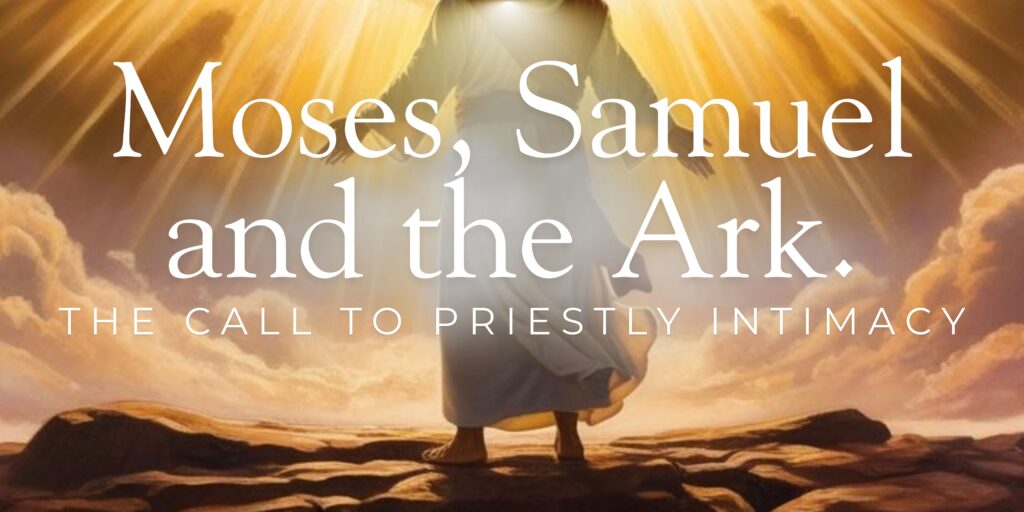
The Old Covenant: Glory Revealed to the People
In Leviticus 9, we see the pattern of God’s presence in the old covenant. Moses commanded the people to bring sacrifices—offerings of blood, bulls, goats, and rams—so that “the glory of the Lord may appear to you.” When the sacrifices were presented, fire came from the Lord, consuming the offerings, and all the people fell on their faces.
But this was a covenant of fading glory—a ministry of death and condemnation (2 Corinthians 3:7-9). Now, in Christ, we have the ministry of righteousness and life. His blood was shed not just so the glory of the Lord would appear to us, but so His glory could dwell in us and upon us!
Under the old covenant, Moses’ face radiated with light because he had been in God’s presence. If the fading covenant could transform him physically, how much more should we expect under the greatercovenant of the Spirit? We are being transformed from glory to glory!
The Ark: The Meeting Place of God
When God gave Moses instructions for the Ark of the Covenant (Exodus 25:10-22), He established it as the meeting place between heaven and earth:
“There I will meet with you… and I will speak with you.”
Moses experienced the presence of God in the tent of meeting, where the cloud of the Lord would descend, and God would speak to him face to face, as a man speaks to his friend (Exodus 33:11). It was in this intimacy that Moses received wisdom, leadership, and the revelation of God’s ways.
Moses knew that God’s presence was the only thing that set His people apart. He cried out:
“If Your presence will not go with us, do not bring us up from here!” (Exodus 33:15).
Moses was not content with blessings—he wanted God Himself. He longed for more, saying:
“Please, show me Your glory!” (Exodus 33:18).
And God responded:
“I will make all my goodness pass before you and will proclaim my name.”
God’s glory is not just power—it is His nature, His goodness, and His presence.
Samuel: A Generation Who Ministered to the Lord
Centuries later, a young boy named Samuel was growing up in the temple, sleeping beside the Ark of God (1 Samuel 3). The Word of the Lord was rare in those days, but Samuel positioned himself where God’s presence rested.
Then, the Lord came and stood before him.
God called Samuel by name—just as He had called Moses.
At first, Samuel did not recognize His voice, but when he responded, “Speak, Lord, for your servant hears,” everything changed.
• The Lord was with him.
• The Lord established him as a prophet.
• The Lord revealed Himself to him at Shiloh.
Samuel’s intimacy with God made him a leader and a voice for his generation. He was a priest and prophet, one who walked in the presence and counsel of God.
Samuel Among Moses
In Psalm 99:6-7, Samuel is named alongside Moses as one who called upon the Lord and received answers from the cloud of His presence.
This is remarkable. Moses had spoken face to face with God. Now, Samuel—born in a later generation—was counted among those who had the same intimacy with the Lord.
Samuel did not merely serve in the temple; he ministered to the Lord. He laid near the Ark, the place of divine encounter. And in that place, the Lord appeared to him, spoke with him, and raised him up as a prophet.
We Are Called to the Same Intimacy
The secret place that Moses and Samuel walked in is now open to us. We are invited into priestly intimacy—to meet with God in His presence, to hear His voice, and to walk in His glory.
The Ark contained:
1. Manna (Christ, the Bread of Life)
2. The Tablets of the Law (The Word, Jesus Himself)
3. Aaron’s Rod (The Holy Spirit, the power and authority of God)
We are now the ark of God—the dwelling place of His presence. We are called to:
• Minister to the Lord like Samuel.
• Speak face to face like Moses
Listening and following His Leading
Moses and Samuel show us the power of hearing God’s voice:
• Moses spoke with God face to face and led the people through divine encounter.
• Samuel ministered to the Lord, heard His voice, and became His prophet.
The government is on His shoulders (Isaiah 9:6). As we steward His voice, He stewards the government. Our calling is not to move to the demands of men, but to move to the rhythm of His voice. As we listen, He will lead.
The call is clear: Come to the Ark. Enter the secret place. Minister to the Lord. Seek His face. In doing so, we are transformed and made carriers of His glory.
By Micah Level
